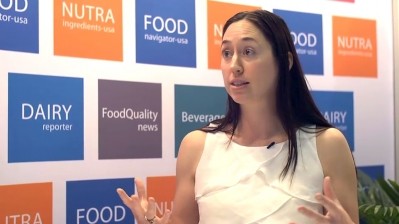Probiotics in space: NASA explores viability of microorganisms for space flight

This has even led some scientists to ask, “could spaceflight-associated immune system weakening preclude the expansion of human presence beyond Earth's orbit?” (Gueguinou et al, 2009)
Because probiotics have been shown in numerous studies on earth to provide benefits for such issues, NASA scientists are exploring if such benefits would translate to the microgravity conditions experienced during spaceflight.
A scientific first
At least one strain would be fine: Writing in Acta Astronautica, scientists from NASA Johnson Space Center, JES TECH, and the J. Craig Venter Institute reported that Lactobacillus acidophilus ATCC 4356 cultured anaerobically under low gravity conditions (called Low-Shear Modeled Microgravity or LSMMG) in a rotating-wall vessel (RWV) bioreactor behaved just as it does on earth.
“To our knowledge, ours is the first study to document the anaerobic LSMMG response of a beneficial probiotic organism that is a natural inhabitant of the low-fluid-shear regions of the GI tract,” wrote the researchers, led by Dr Grace Douglas, Advanced Food Technology Lead Scientist at the NASA Johnson Space Center. “Therefore, it is not surprising that this is the first case where results indicate an absence of altered growth, stress response, and gene expression between LSMMG and control cultures.”
“The lack of significant changes in gene expression when L. acidophilus is subjected to LSMMG under anaerobic conditions suggest that this particular L. acidophilus would behave similarly in both spaceflight and on Earth,” they added.
The ultimate goal
A 1977 microbiome analysis from Skylab was limited to species and strains that were culturable.
Speaking with NutraIngredients-USA, Dr Douglas noted that she has also co-authored a review of probiotics associated with clinical improvements in crew-relevant illness and conditions (Beneficial Microbes).
“The ultimate goal is to find countermeasures that are non-invasive and succeed on long-term flight,” she said. “Food is being sent anyway, so can we develop food products that deliver these ingredients?”
No fermented foods or probiotic products are currently included in an astronaut food system because of the strict microbiological controls and lack of refrigeration on a spacecraft, she said.
“We do send a powdered milk so we could potentially add probiotics to that, but the spaceflight microbiological standards would have to change.”
Prebiotics
Dr Douglas also considered the potential role of prebiotics in the space food system in her review. A prebiotic is defined as, “a substrate that is selectively utilized by host microorganisms conferring a health benefit”.
“Prebiotics work when you have microorganisms there to benefit in the first place,” said Dr Douglas. “The best approach is to take both prebiotics and probiotics together. Space flight promotes a healthy well-rounded diet so prebiotics would be in there in the first place.”
Sources: Acta Astronautica
Volume 139, October 2017, Pages 463-468
“Response of Lactobacillus acidophilus ATCC 4356 to low-shear modeled microgravity”
Authors: S. Castro-Wallace et al.
Beneficial Microbes
2017, doi: 10.3920/BM2017.0027
“Evidence based selection of probiotic strains to promote astronaut health or alleviate symptoms of illness on long duration spaceflight missions”
Authors: G.L. Douglas & A.A. Voorhies
















